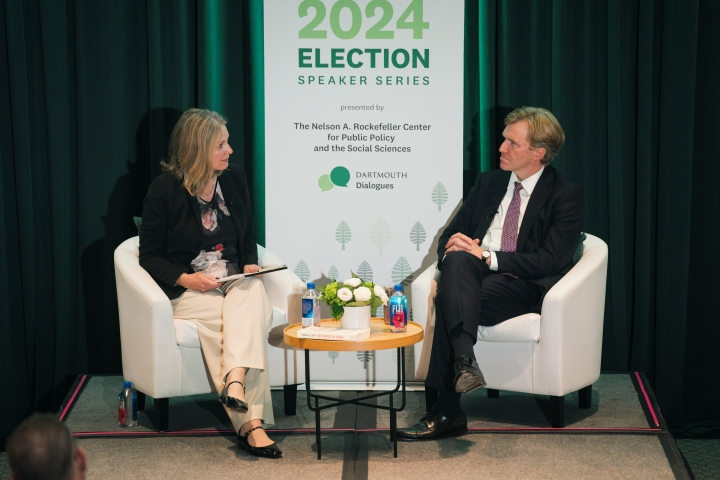Events abroad rarely play a leading role in how Americans decide national elections, but the steady rise of China as an economic and military superpower should be the top foreign policy priority for future presidential administrations, conservative defense strategist Elbridge Colby asserted Tuesday evening.
“I think it’s empirically true that China is preparing for war, and we do have the possibility of a multi-front war and the possibility of a World War III in the coming years, and we’re not prepared. We need to prioritize the potential for a conflict with China precisely in order to avoid it,” Colby argued to an audience of 130 at Filene Auditorium, with another 25 also watching via livestream.
The event was part of Dartmouth’s 2024 Election Speaker Series, co-sponsored by the Nelson A. Rockefeller Center for Public Policy and Dartmouth Dialogues.
Colby served as deputy assistant secretary of defense for strategy and force development during the Trump administration and was a key figure in the development of the 2018 National Defense Strategy. He also served during the George W. Bush administration with the Coalition Provisional Authority in Iraq in 2003 and on the 2004-2005 President’s Weapons of Mass Destruction commission, as well as the 2008-2009 Strategic Posture Commission.
The author of The Strategy of Denial: American Defense in an Age of Great Power Conflict and the grandson of former CIA director William Colby, Colby has been mentioned as a possible national security adviser should Donald Trump regain the White House.
Responding to a question from moderator and Associate Professor of Government Jennifer Lind about the argument that China does not pose an existential military or economic threat to the United States, Colby said that “intentions change. What I have to pay attention to is strength.”
China, for instance, has carried out threatening military maneuvers near Taiwan, which has been a self-governing entity since 1949, but which China believes should be unified with the mainland.
“If you look at it more from the geopolitical realist’s point of view, China has a natural incentive as a rising great power to try to strive toward greater influence and hegemony at a tolerable cost and risk,” Colby said.
While the United States is the world’s leading economy, China is second. And given the decline of American manufacturing in the past four decades, underestimating China would be a mistake, Colby argued. The capacity of its economy “is astounding and orders of magnitude above what we can do. We are better off preparing for preventing a catastrophic defeat in the most important theater by our primary rival rather than betting on the lottery,” he said.
Lind pointed out that the American people, and even those in government, rarely have substantive foreign policy debates—at least publicly—about what the choices and directions are. “If you accept the need to prioritize, what do you prioritize?” she asked.
Colby said he is a pragmatist who sees the merits and failings of both the isolationist and internationalist wings of the Republican Party.
“We can’t withdraw from the world. But on the isolationist side, we’ve gotten into a lot of dumb wars, we’ve worn out the American people, and we’ve caused problems we didn’t need to generate. But if you withdraw, China will dominate Asia,” Colby said.
“If you lean into one region, it necessitates leaning out of another region,” Lind countered, pointing out that the Europeans worry about an American shift away from Europe and Russia to Asia.
“We became hubristic after the collapse of the Soviet Union,” Colby said. The implied deal between the United States and such powers as Germany and Japan is that the latter two were able to cut defense spending while the United States increased defense spending and played global policeman, he said.
“Who does that not benefit? The American people,” Colby said.

What Colby would like to see in American foreign policy, he said, is an increased focus on Asia, coupled with “clear and credible messages to Beijing that we are not trying to strangle China, that we do not think that Taiwan should be independent, that we do not think that Xi Jinping is Hitler, and yet many of these things are all said, unfortunately.”
He favors a return to a more “hard-headed strategy” in foreign affairs, in the mode of the Eisenhower and Nixon presidencies, and the foreign policy of James Baker, secretary of state in the George H.W. Bush administration.
“China may not like it, but they can deal with it,” he said.
After the speech, students said they were glad to hear Colby’s perspective. Ryan West ’28 is the son and grandson of U.S. marines and is contemplating joining the military. He said that foreign policy discussions happen frequently at home. As someone who will vote for the first time in the upcoming election, he wants to learn more about China’s global power. “Everybody’s thinking about the economy, and it feels like foreign policy is not discussed a lot. It’s nice to hear people who are very informed about foreign policy,” West said.
Maia Bazo ’28 was struck by Colby’s “realist approach to politics and how he discerns which countries to focus on,” she said.


